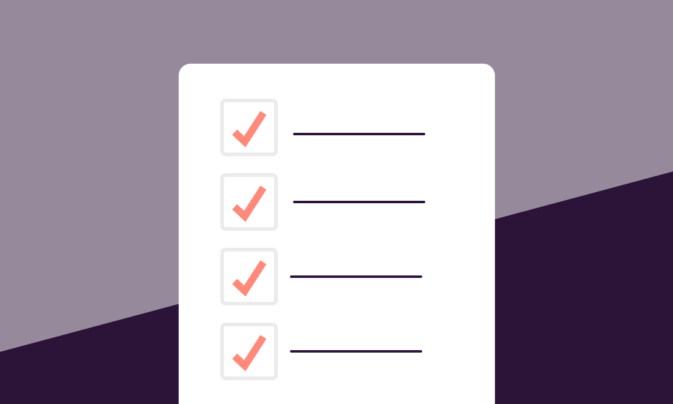If you’re like most of us, you’re likely tired of hearing about how ChatGPT and generative AI are going to take all our jobs (spoiler alert: they’re not — at least not anytime soon), but that doesn’t mean we shouldn’t all be learning how to make technology work for us.
For employees to survive and thrive in a fast-paced, change-fuelled future, they need meta-skills: the ability to learn, understand, and adapt — fast. 73% of employees globally report they don’t currently feel equipped to learn the digital skills needed by businesses now, and that’s a scary reality.
So, let’s explore what meta-skills encompass and which ones result in productive, creative people ready for whatever tomorrow brings (hopefully more human empathy and fewer robot overlords, but hey, we’re open to just a sunny day and some good vibes).
TL;DR — Key Takeaways
- To stay ahead of changes and ensure synergy between human and technological resources, organizations must prioritize meta-skills for current and future employees.
- What are meta-skills exactly? A meta-skill is a higher-order skill that boosts a person’s ability to learn and apply new knowledge quickly.
- A few meta-skills examples include capabilities like learning a new language, plug-and-play skill transfer between industries, or the ability to solve complex problems.
- According to studies, the three main meta-skills are self-awareness, creativity, and resilience, as these create the biggest impact in the modern workplace.
- Additional meta-skills all candidates and employees should strive to build and improve include learning and applying info quickly, having a high level of emotional intelligence, and problem-solving.
- You can assess meta-skills to understand what level a candidate is at with Toggl Hire’s skills assessment platform. Create a customized test around specific skills in just a few clicks.
The changing world of work
Even though the world of work is changing fast, we know two things for sure.
☝️ The first is that AI and automation are here to stay. 55% of Americans regularly interact with AI, and the global AI market is expected to grow by 19% through 2032. The simple reality is that, as a society, we’ve grown to rely on technology to make our lives easier or to solve problems.
✌️ The second point is that these technological advances are permanently changing the role of humans in the workplace. Technology is challenging the standard notion of what makes a great employee. And while technology is the lever that enables agile change, organizations need employees with the right soft skills to work those levers.
A company’s capacity to learn determines its capacity to adapt and, ultimately, its chances of surviving far into the future. If your company isn’t learning, it isn’t growing—and it’s probably on a losing path.
Boston Consulting Group | Source
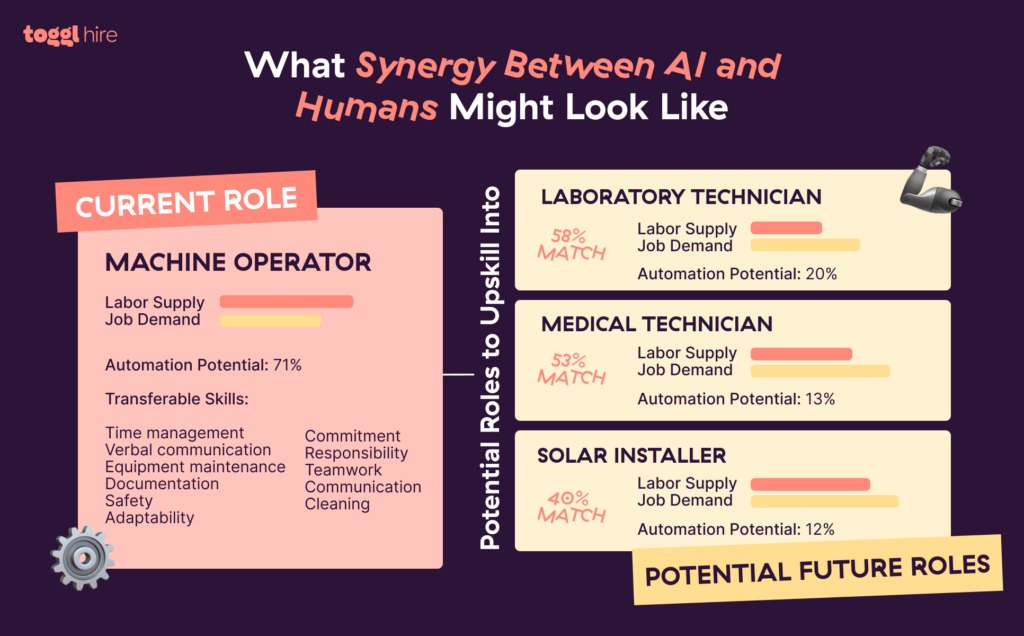
Looking at the current upward trend in upskilling and lifelong learning, what skills should organizations prioritize that’ll have the biggest impact on success? To keep one step ahead of the fourth industrial revolution, forward-thinking businesses are, of course, looking for candidates with meta-skills.
The illiterate of the 21st century will not be those who cannot read and write, but those who cannot learn, unlearn, and relearn.
Alvin Toffler, Futurist | Source
What is a meta-skill? Definition and examples
A meta-skill is the ability to learn and apply new knowledge quickly. Also known as meta ability, it’s an overarching range of capabilities people need to learn new skills faster or drive functional expertise in other skills.
If you’re wondering why soft skills, like these meta-skills, are so crucial all of a sudden for the workforce, the World Economic Forum spells it out pretty clearly:
By 2025, 85 million jobs may be displaced by machines, according to the Forum’s Future of Jobs Report 2020, but 97 million new roles may emerge that are more adapted to the new division of labour between humans, machines and algorithms.
World Economic Forum
Meta skills are core skills that we adopt through deep learning. They tend to be more lasting than learning to use a new HR software tool, for example, and are in short supply for many organizations.
According to McKinsey, “Research indicates that 50% of leaders are facing business problems due to an unforeseen skills gap; the majority believe that upskilling and reskilling are the crux of the solution.”
Fact! The term “meta-skills” originated with the business innovator Marty Neumeier. In his book, Metaskills: The Five Talents for the Future of Work, Marty explains that “most people lack the skills to address today’s challenges because they are unequipped to approach the complexity of a connected and interdependent world.”
A few common examples of meta-skills
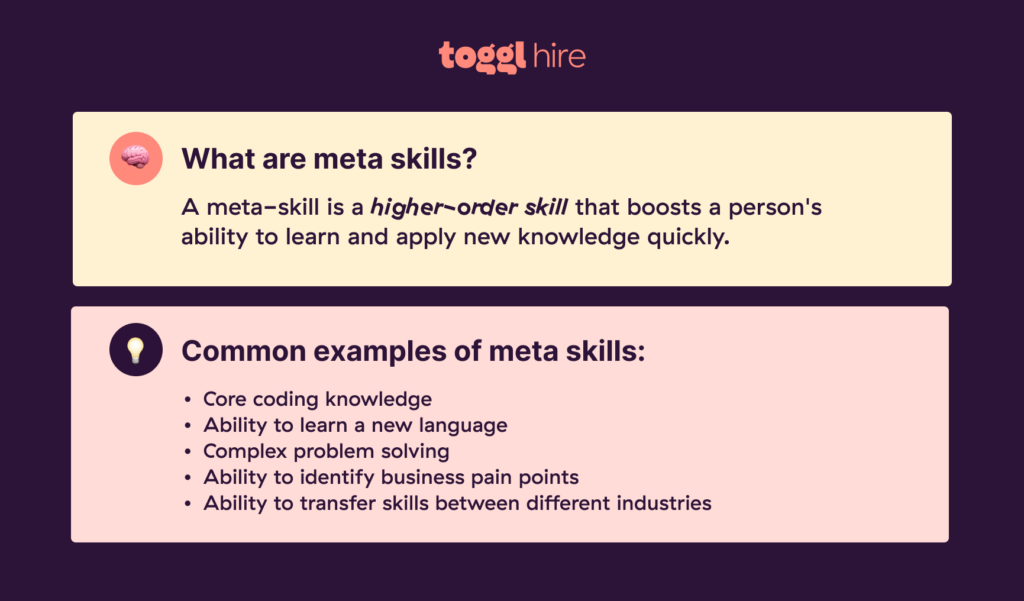
Meta skills will only grow in importance, but the good news is that you should have already encountered a few of them — or mastered them yourself. Like these:
- Ability to transfer core skills between different industries
- Ability to learn a new language
- Core coding knowledge
- Complex problem solving
- Ability to identify business pain points
While those are all good examples of meta-skills, there are other specific three that would future-proof any applicant or employee.
What are the three meta-skills that every employee should develop?
Soft skills, like effective communication and interpersonal skills, and hard skills, like data analytics, all have their place in the make-up and success of a good employee in our digital age.
Yet, these three meta-skills are ones that every employee should and can develop for a lasting career advantage: self-awareness, creativity, and resilience.
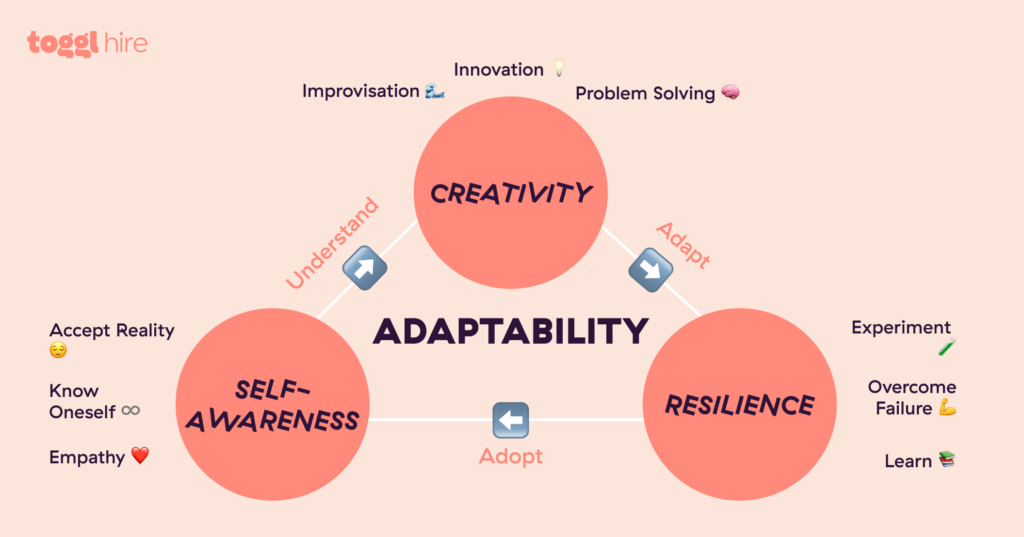
1. Self-awareness
Self-awareness is about more than knowing yourself. It’s a quality or trait that includes knowing your strengths and weaknesses, triggers, how you typically respond to particular situations, awareness of your effect on others, empathy, and understanding of other peoples’ realities.
We’ve found that even though most people believe they are self-aware, self-awareness is a truly rare quality: We estimate that only 10%–15% of the people we studied actually fit the criteria.
Dr. Tasha Eurich, organizational psychologist | Source
2. Creativity
Creativity isn’t typically something learned in school, and children are often branded as “naturally” more creative than others. Yet, as Albert Einstein said, “We cannot solve our problems with the same level of thinking that created them.”
We need to be able to change gears or think creatively to solve new problems at work or personal lives more quickly. It’s about letting go of binary thinking (thinking there are only two sides to every situation) and embracing our imagination.
And since AI is now encroaching on creative job functions, like digital design and copywriting, it presents us with another opportunity to use meta-skills.
In 2024, and throughout the next decade, we’ll need to find ways to work creatively with generative AI to enhance our work, like using it to get new content ideas or to create the first draft of a computer program.
3. Resilience
Resilience is all about being able to challenge yourself, being willing to fail, and then immediately adapting and trying a new approach. Your adaptability actually hinges on your willingness to fail.
Resilience is the ability to not only recover quickly from a crisis but to bounce back better—and even thrive.
McKinsey | Source
Those able to adapt quickly and not give up when things get tough will have what it takes to ride the wave of any new or unexpected change we’ll experience in 2024 and beyond. They’ll be the ones that innovate and succeed and create competitive advantage for organizations.

The top 6 meta-skills to look for in candidates
Hiring candidates with meta-skills means creating a workforce that is stable, adaptable, and not afraid to act quickly. Is that the kind of workforce you’re looking to build in 2024? We thought so, so let’s explore the six core attributes they’ll bring to the party.
1. Learning capacity
The overarching and possibly most essential meta-skill, the one skill to rule them all, is a person’s ability to learn. If a person can’t learn and apply new skills quickly, they’ll be at a severe disadvantage in an automated world.
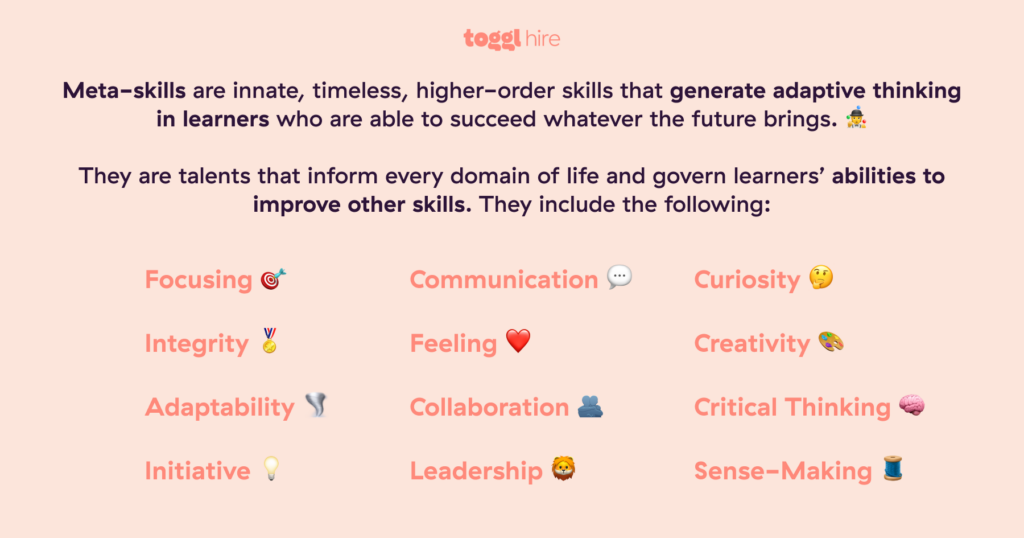
What’s more, constant learning has become part of how we operate in modern business.
Tips to improve your learning ability:
- Figure out which learning style you prefer — visual, tactile, or audio, and find resources that support that style, such as YouTube videos for visual learners.
- Make sure you understand all the core terms of a new subject or new industry you’re planning to be involved in. You could even create a glossary for yourself.
- Use visual aids, such as flashcards or drawing sketches and mind-maps of the concepts you learn about.
- Take notes. Yes, good old-fashioned notes can help you out of a bind if you’re learning a new skill or tool and need to quickly refer back to a particular step in a process, for instance.
- Get some exercise. It’s good for the mind and body!
2. Emotional intelligence
Emotional intelligence is the ability to manage your own feelings and responses effectively and be aware of how others are feeling.
People with high emotional intelligence use empathy, self-awareness, and social awareness to manage how different people in a group interact, resolve conflicts easily, and ultimately create a positive, productive work environment.
This is a valued and important skill used by leaders as it can help to build confidence and trust in teams.
A leader needs to have all of those skills, including de-escalating and empathizing with people, especially in these times. Emotional intelligence is one of the key things of working with people and helping people grow.
Forbes | Source
3. Perspective
Perspective is about being able to see and understand different points of view. In other words, be able to put yourself in the shoes of your boss, colleague, client, or competitor and holistically understand what their priorities are and why.
Studies show that perspective-taking can:
- Help you be more present rather than focusing on why your way is the best
- Support a better integration of knowledge and experience
- Help teams work more synergistically
- Help us learn better from each other
4. Storytelling
Storytelling is a way of communicating ideas through stories. Since research reveals that approximately 65% of us are visual learners, it makes sense to use this medium for persuasive business communication with clients.
Organizations use storytelling to simplify complex problems or concepts and lead their audience to a particular conclusion, such as why the business’ product best solves their pain points.
Storytelling is used across various departments and industries:
- Marketing communication, such as blogs or infographics
- Data analytics to show insights visually through charts and graphs to support data-driven decisions
- Selling your business ideas to investors
- Creating persuasive presentations
- Creating explainer videos that demonstrate your product’s value
Research indicates that stories can be far more effective at selling a job than impressive facts and figures. With only 5% of the latter being remembered after just 10 minutes, against the 65% of stories.
DeepStash | Source
5. Creative problem-solving
The ability to solve complex problems quickly means being able to spot what the actual problem is. And that means being able to focus, be objective, and look at potential problems from a distance.
When this goes together with a lot of experience across the business, leaders can:
- Come up with practical solutions quickly
- Ensure teams keep producing quality work in good time
- Override complacency and help teams work smarter
- Help the business quickly adapt to change
Design thinking is a great approach to solving problems efficiently. It helps teams move from problem to solution in an iterative way that ensures practical solutions.
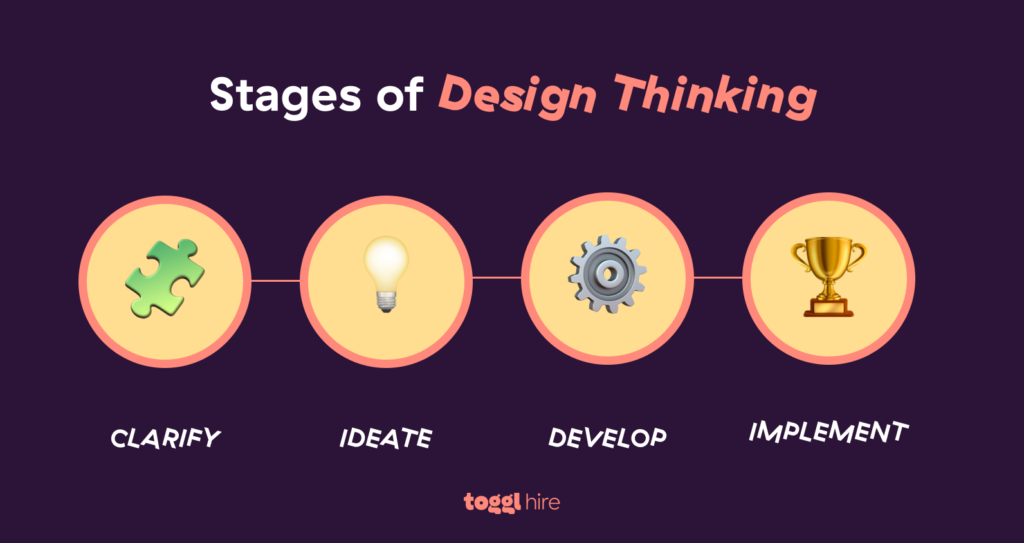
6. Leadership
A natural career path often leads employees from being juniors to taking on more responsibility and eventually managing other team members.
This is an important meta-skill to develop, as it has a positive impact not only on the individual but also creates growth for teams and the organization.
Effective leadership can inspire confidence and create a supportive environment that nurtures meta-skills in other employees, boosting self-esteem, self-confidence, and overall abilities within teams.
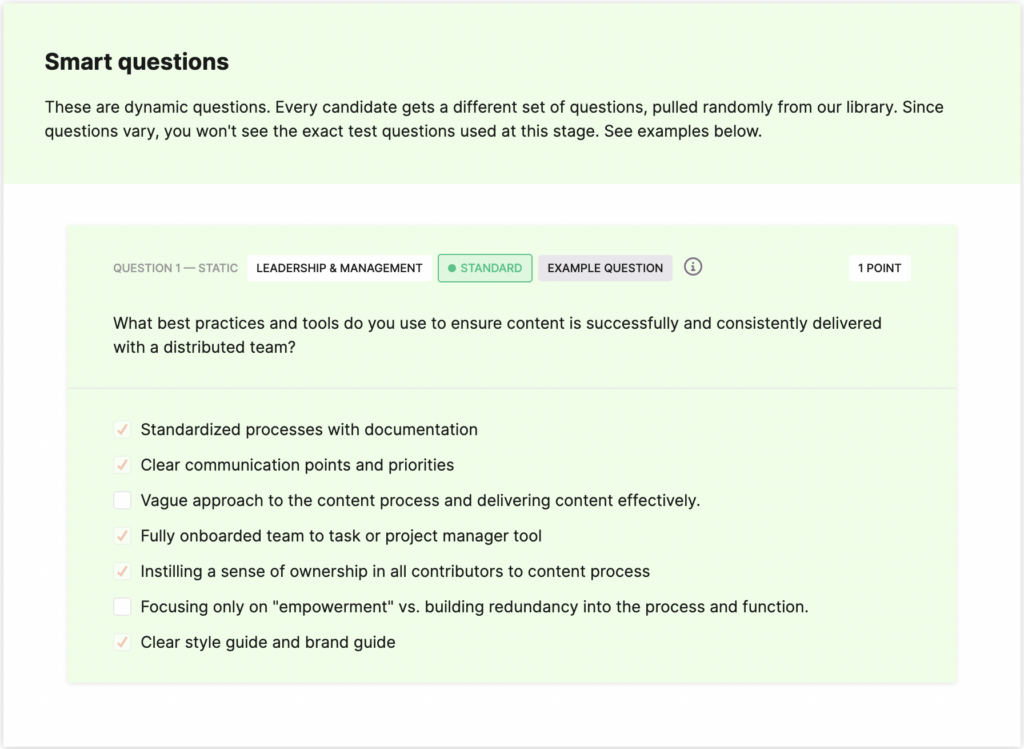
Evaluate your candidates’ meta-skills (and any other skills) with skills assessments
Recruiters and hiring teams may need to start thinking differently about traditional role-based hiring. Creating opportunities based on skills might be a more suitable approach for today’s globally connected workforce (and keep us a step ahead of the robot takeover 😉).
If you’re looking for a way to hire future-ready candidates or to modernize your talent mobility strategy, then you can stop looking. With Toggl Hire, you can create skills tests based on specific skills that match your requirements.
Faster and more objective hires are a click away! Future-proof your business and hire smarter this year by browsing our assessment library.

Juste loves investigating through writing. A copywriter by trade, she spent the last ten years in startups, telling stories and building marketing teams. She works at Toggl Hire and writes about how businesses can recruit really great people.






